This article was medically reviewed by Luba Lee, FNP-BC, MS. Luba Lee, FNP-BC is a Board-Certified Family Nurse Practitioner (FNP) and educator in Tennessee with over a decade of clinical experience. Luba has certifications in Pediatric Advanced Life Support (PALS), Emergency Medicine, Advanced Cardiac Life Support (ACLS), Team Building, and Critical Care Nursing. She received her Master of Science in Nursing (MSN) from the University of Tennessee in 2006.
There are 7 references cited in this article, which can be found at the bottom of the page.
wikiHow marks an article as reader-approved once it receives enough positive feedback. In this case, 88% of readers who voted found the article helpful, earning it our reader-approved status.
This article has been viewed 591,380 times.
Cold sores are small blisters that form on the lips or around the mouth as a result of the herpes simplex virus. You can get the herpes simplex virus by coming into contact with a cold sore or lesion on an infected person, or through contact with an infected person’s saliva – even if they are not showing any symptoms at the time. Clusters of cold sores or fever blisters on one area of the lip are the most common symptoms of a herpes simplex 1 infection, but in rare cases you may also get other symptoms, like fever, body aches, or tiredness. The skin around the blisters is typically sore, red and swollen. An outbreak can be triggered by skin injury, sun exposure, stress, tiredness, fever, or menstruation. Once you are infected with the virus, there is no way to completely prevent future cold sores. However, there are some things you can do to reduce the frequency of cold sores. Taking action at first signs of an outbreak could prevent the sore from forming.
Steps
Triggers
-
1Don’t kiss a person with a cold sore. The herpes virus can be transmitted from person to person through direct contact with a cold sore or fever blister. If you already have the virus, kissing or other close contact with someone who has a cold sore can trigger an outbreak in you. Avoid intimate contact with the other person until their symptoms go away.
-
2Avoid sharing personal items with an infected person. Take care not to share cups, toothbrushes, face towels, or other personal items that might have come into contact with the infected person’s saliva or active cold sores. Even if they aren’t currently showing any symptoms, you might still be able to catch the virus.Advertisement
-
3Protect your face from the sun. Exposure to ultraviolet (UV) rays can trigger a cold sore outbreak. You can prevent a cold sore from forming by taking precautions before going out in the sun. Wear good quality sunblock on your face each time you go outside. Make sure your lip balm contains SPF 15 or higher as well.
- Even during the winter, the sun can trigger an outbreak. Be sure to wear sunblock all year round.
- Tanning beds can also trigger outbreaks. If you're sensitive to the sun, you'll also be sensitive to the UV light used in tanning beds.
-
4Eat a balanced diet. Your immune system can suffer if you aren't getting adequate nutrition. When you aren't watching what you eat, you're more likely to have a cold sore outbreak. Focus on eating a healthy, balanced diet that includes plenty of produce, protein and whole grains.[1]
- Increase the amount and variety of raw vegetables and fruit that you eat. In particular, consume broccoli, brussel sprouts and cabbage. These vegetables are high in indole-3-carbinol (I3C), which may interfere with the growth of the herpes virus. Other high I3C foods include watercress, kale, chard, and spinach.[2]
- Decrease the amount of processed meat products, saturated animal fats, white and refined sugars, artificial sweeteners, white flour, alcohol and caffeine that you consume. All of these are known to increase the frequency of cold sores.
- Avoid foods that have a high amount of arginine. Arginine is an amino acid that serves as a building block for cold sores. Foods high in arginine include chocolate, nuts, seeds, oats, beer and most protein shakes.
- Avoiding spicy or acidic foods may help prevent or reduce cold sore outbreaks in some people.
-
5Take vitamins and minerals to boost your immune system. Quercetin, lysine, zinc, and vitamins C and E have all been shown to strengthen the immune system help the body fight off cold sore outbreaks.[3] Eat foods that contain these vitamins and minerals, or take supplements. Good dietary sources include:
- Apples, red grapes, cherries, berries, broccoli, and capers for quercetin.
- Nuts, seeds, cheese, and yogurt for lysine.
- Peppers, citrus, greens (like chard or spinach), and berries for vitamin C.
- Sunflower seeds, greens (like chard or spinach), avocado, nuts, and olive oil for vitamin E.
- Shellfish, beef, fortified cereals, pumpkin seeds, and garlic for zinc.
-
6Keep your stress level down. When your body is overtaxed, your immune system suffers and the virus is more likely to make itself known. Many people have outbreaks when they're feeling generally run down and stressed out. Take the following measures to keep yourself well rested and calm:
- Get plenty of sleep. Pulling all-nighters and rushing around all day takes a toll. Do your best to adhere to a sleep schedule that allows you to get seven to eight hours of sleep, so you feel well-rested.
- Exercise regularly. Exercising is a good stress reliever that can help you calm down during anxious times. It also tires you out in a healthy way so you can sleep better at night.
-
7Protect yourself during flu and cold season. Getting the flu or a cold is a common trigger for cold sores. The winter months can be particularly trying, so pay special attention to your habits when the weather turns cold and illnesses start getting passed around.
- The best way to keep yourself from getting sick is by washing your hands regularly using soap and warm water. Take special care when you spend time in a public setting, such as the subway or train station.
- Getting a flu shot can also protect you from several of the most common strains of flu virus.
- As soon as you start feeling a cold coming on, make sure you're well hydrated and try to get some rest. Avoid staying up to late and drinking alcohol. Sometimes you can stop a cold from taking hold if you catch it soon enough.[4]
-
8Take care of yourself when you're about to menstruate. Menstruation can be a trigger for some women, so it's important to anticipate the problem and head it off each month. As your period approaches, make sure you're getting plenty of sleep, eating well, and staying hydrated. These actions will help to reduce your other menstrual symptoms as well.
-
9Change your toothbrush regularly. The herpes virus can live on your toothbrush, so it's important to change it often. When you develop a cold sore, throw your toothbrush away. When the cold sore goes away, change your toothbrush again. This will prevent you from getting a second outbreak after the first one goes away.
Home Remedies
-
1Recognize the signs that a cold sore is forming. Many cold sore sufferers know that an outbreak is coming before the actual blister appears. The symptoms vary for individual sufferers, so it may take a few outbreaks before you learn what yours are. When you know a cold sore is coming, you can use a treatment to stop it in its tracks.
- Pay attention to tingling sensations or pain on your lips. The majority of sufferers report a "funny feeling" in the area a few days before the sore develops.
- If you get a sore throat, swollen glands and fever, you may be about to get a cold sore.
- Some people experience an increased amount of saliva or drooling before a cold sore forms.
-
2Treat the area with ice. When you feel a cold sore coming on, fill a plastic sandwich bag with ice and wrap a dish towel around it. Apply ice to the area where you feel a cold sore forming for 10 to 15 minutes at a time. Repeat the application every hour. Cold sores require warmth and moisture to develop. Keeping the area cool may prevent the cold sore from forming.
-
3Treat it with a tea bag. Soak a tea bag in hot water and allow it to cool. Apply the bag to your lip for three to five minutes every hour. Tea contains tannic acid, which is believed to possess antiviral properties. Many over-the-counter treatments for cold sores also contain tannic acid.
-
4Try lemon balm cream. Lemon balm is an herb in the mint family that has been shown to prevent cold sores from forming. When you feel the telling tingle of a cold sore coming on, apply a dab of lemon balm cream and let it soak into your skin. Reapply as necessary according to the instructions on the packaging.
- Lemon balm cream is available in drugstores. If you grow your own lemon balm, try rubbing a fresh leaf over the area.
- Lemon balm has also been shown to help cold sore outbreaks go away faster. It is safe to apply to open sores.
-
5Use a product containing lysine. Lysine is an amino acid that effectively prevents cold sores from forming. It stops the herpes virus from growing when applied to the skin.[5] It can also be applied to open sores to help them heal more quickly. Look for lysine cream with a 70:1 concentration. You can find lysine cream over-the-counter at drug stores. Apply according to the instructions on the packaging.
-
6Try propolis ointment. Propolis is a resin produced by bees. It contains antioxidants and boosts immune function. Studies show that propolis stops the herpes virus from reproducing. Applying propolis ointment when you feel your skin start to tingle may prevent an outbreak from occurring.
-
7Apply peppermint oil. Peppermint oil is thought to have properties that prevent exposed herpes particles from entering new cells. If you already have a cold sore, applying peppermint oil may help prevent it from spreading to another area on your lips. Peppermint oil may also help the erupted sore heal more quickly.[6]
Medical Treatments
-
1Use a medicated mouthwash. Medicated mouthwashes or rinses can help reduce pain from cold sores inside your mouth. Look for a rinse containing an anesthetic, such as a 2% viscous solution of Lidocaine.
-
2Use a medicated cream. Oral herpes can be treated with antiviral cream that prevents the herpes virus from growing. Antiviral creams stop the virus from entering new skin cells. The cream may be applied before or during an outbreak. Use one of the following antiviral creams:
- Docosanol (Abreva): This is available over-the-counter. Apply according to the instructions on the packaging.
- Penciclovir (Denavir): This cream is available by prescription only. See a doctor to for a prescription and instructions on how to use it. The typical dosage is a 1% cream applied once every two hours while you are awake, over the course of four days.
- Acyclovir: This is another prescription cream, typically given at a 5% concentration and used five times a day for four days.
-
3Take antiviral medicine. Oral antiviral medicine is an effective preventative treatment for oral herpes. Antiviral medicine may be taken either continuously or at the first sign of outbreak. It is available by prescription only, so make an appointment with your doctor to discuss your options. Antiviral medications include the following:
- Acyclovir (Zovirax), usually taken three times a day for7-10 days.
- Famciclovir (Famvir), usually taken 2-3 times a day for 7-10 days.
- Valacyclovir (Valtrex), usually taken twice a day for 7-19 days.
-
4Protect your lips from sun exposure during treatment. Exposure to sunlight can make you more susceptible to cold sore outbreaks. Additionally, some anti-viral medications or other treatments may make your skin more sensitive to the sun. Take extra care to protect your lips from the sun by using zinc oxide or a lip balm containing broad spectrum sunscreen.
-
5Get treated for severe infections. If you regularly experience severe outbreaks, you may need special treatment. Some people experience extremely painful, long-lasting cold sores. These can be treated by administering medication intravenously. See a doctor immediately if you have any of the following problems with your cold sores:[7]
- They prevent you from eating and drinking
- They don't heal after two or more weeks
- New outbreaks occur almost continuously
Expert Q&A
-
QuestionWhat does whole milk do for a cold sore?
 Luba Lee, FNP-BC, MSLuba Lee, FNP-BC is a Board-Certified Family Nurse Practitioner (FNP) and educator in Tennessee with over a decade of clinical experience. Luba has certifications in Pediatric Advanced Life Support (PALS), Emergency Medicine, Advanced Cardiac Life Support (ACLS), Team Building, and Critical Care Nursing. She received her Master of Science in Nursing (MSN) from the University of Tennessee in 2006.
Luba Lee, FNP-BC, MSLuba Lee, FNP-BC is a Board-Certified Family Nurse Practitioner (FNP) and educator in Tennessee with over a decade of clinical experience. Luba has certifications in Pediatric Advanced Life Support (PALS), Emergency Medicine, Advanced Cardiac Life Support (ACLS), Team Building, and Critical Care Nursing. She received her Master of Science in Nursing (MSN) from the University of Tennessee in 2006.
Board-Certified Family Nurse Practitioner It is possible that whole milk might be helpful as it contains lactoferrin, which helps fight the herpes simplex virus. You can soak a cotton ball in cold milk and hold it on top of the blister for 10 minutes. It can help cold sore from erupting as well as heal faster.
It is possible that whole milk might be helpful as it contains lactoferrin, which helps fight the herpes simplex virus. You can soak a cotton ball in cold milk and hold it on top of the blister for 10 minutes. It can help cold sore from erupting as well as heal faster. -
QuestionCan coconut oil help with a cold sore?
 Luba Lee, FNP-BC, MSLuba Lee, FNP-BC is a Board-Certified Family Nurse Practitioner (FNP) and educator in Tennessee with over a decade of clinical experience. Luba has certifications in Pediatric Advanced Life Support (PALS), Emergency Medicine, Advanced Cardiac Life Support (ACLS), Team Building, and Critical Care Nursing. She received her Master of Science in Nursing (MSN) from the University of Tennessee in 2006.
Luba Lee, FNP-BC, MSLuba Lee, FNP-BC is a Board-Certified Family Nurse Practitioner (FNP) and educator in Tennessee with over a decade of clinical experience. Luba has certifications in Pediatric Advanced Life Support (PALS), Emergency Medicine, Advanced Cardiac Life Support (ACLS), Team Building, and Critical Care Nursing. She received her Master of Science in Nursing (MSN) from the University of Tennessee in 2006.
Board-Certified Family Nurse Practitioner Yes, coconut oil can be helpful with cold sores as it contains types of good fats that have antibiotic, antiviral and antifungal properties. It also has caprylic and dodecanoic acid which can support the immune system and help fight the cold sore virus. While coconut oil might not provide a full and complete treatment, it can help to support your immune system if taken orally and soothe and moisturize your skin if applied to the cold sore.
Yes, coconut oil can be helpful with cold sores as it contains types of good fats that have antibiotic, antiviral and antifungal properties. It also has caprylic and dodecanoic acid which can support the immune system and help fight the cold sore virus. While coconut oil might not provide a full and complete treatment, it can help to support your immune system if taken orally and soothe and moisturize your skin if applied to the cold sore.
References
- ↑ https://my.clevelandclinic.org/health/diseases/21754-mouth-sore
- ↑ https://nootriment.com/indole-3-carbinol-foods/
- ↑ https://www.ncbi.nlm.nih.gov/pmc/articles/PMC5949172/
- ↑ http://www.webmd.com/cold-and-flu/features/stop-a-cold
- ↑ https://www.webmd.com/vitamins/ai/ingredientmono-237/lysine
- ↑ http://everydayroots.com/cold-sore-remedies
- ↑ http://www.emedicinehealth.com/cold_sores/page3_em.htm
About This Article
To prevent a cold sore from forming, try applying ice wrapped in a dish towel to the area for 10 to 15 minutes. Alternatively, you can apply a used tea bag to your lip for 5 minutes every hour, which has antiviral properties to help prevent a cold sore. You should also eat plenty of raw fruits and vegetables, like broccoli, brussel sprouts, and cabbage, which keep your immune system strong. Additionally, make sure to use SPF 15 or higher during sunny weather, since exposure to ultraviolet rays can cause a cold sore outbreak. For more tips form our Medical co-author, including how to protect yourself from cold sores during cold and flu season, read on!
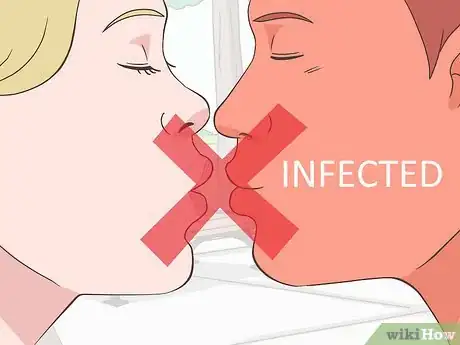
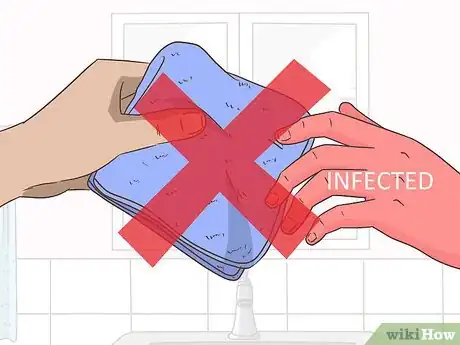
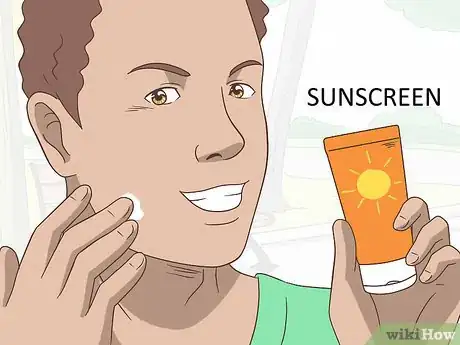
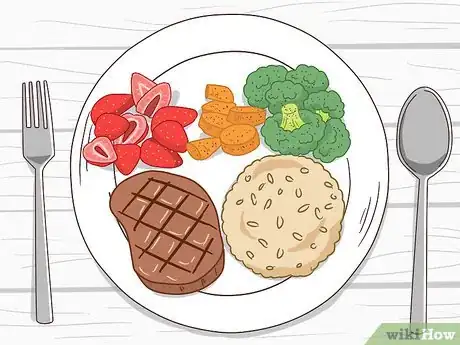
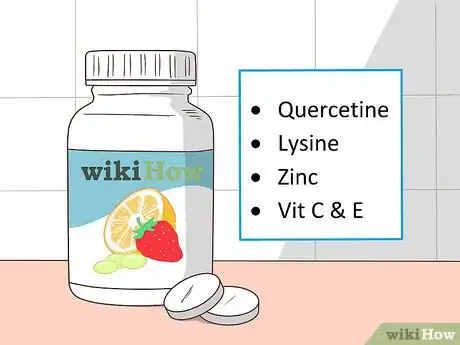
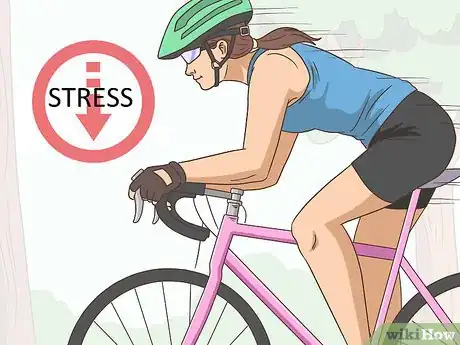
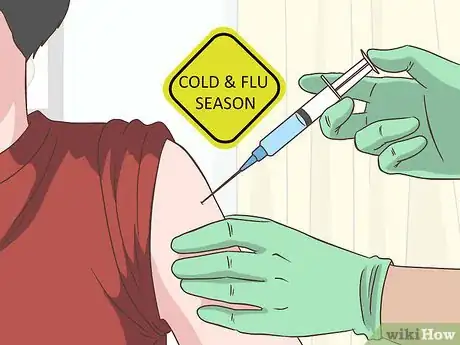
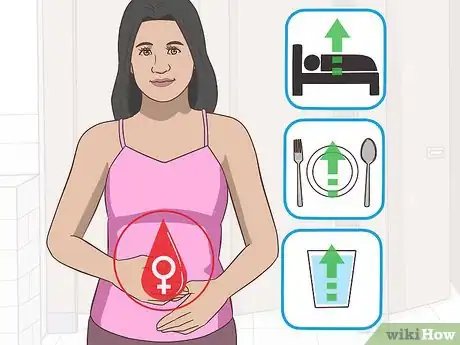
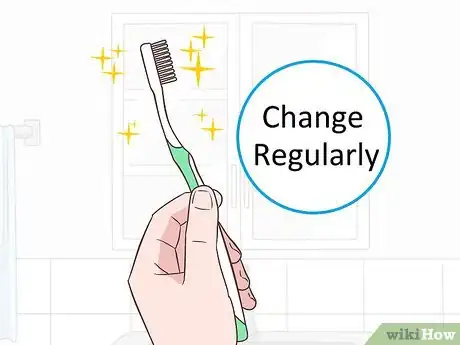
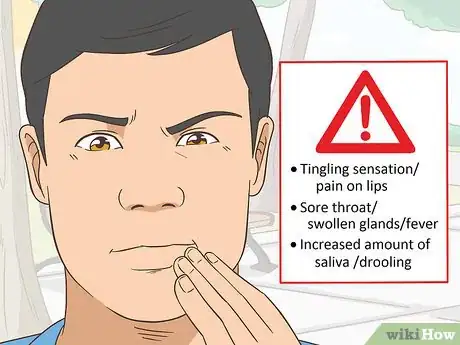
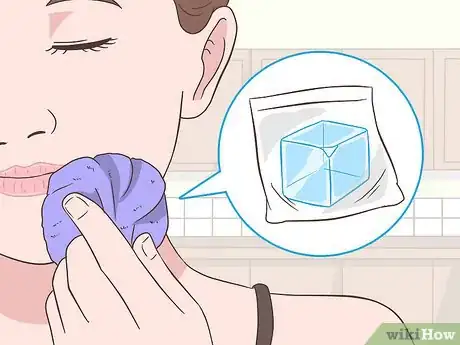
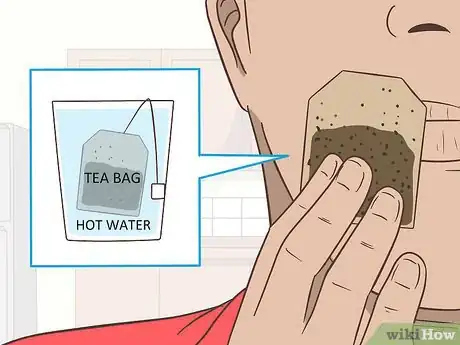
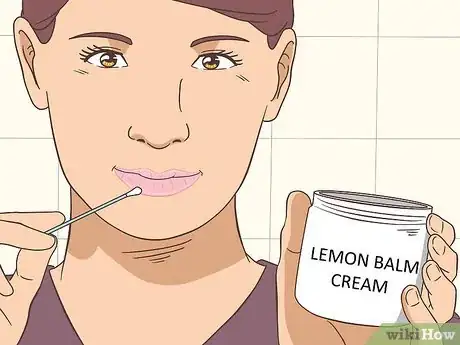
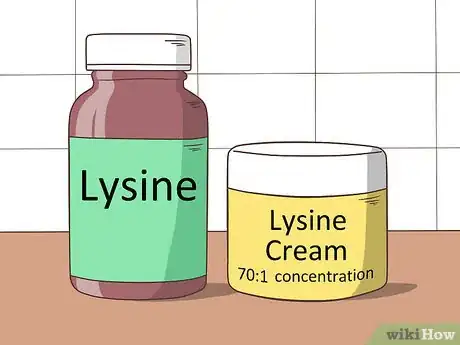
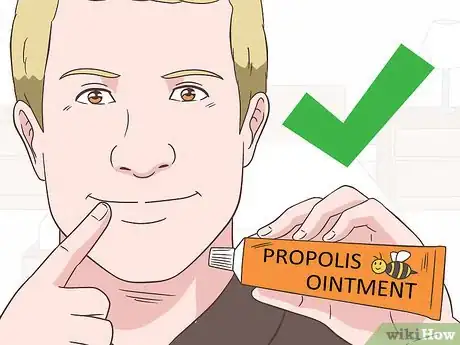
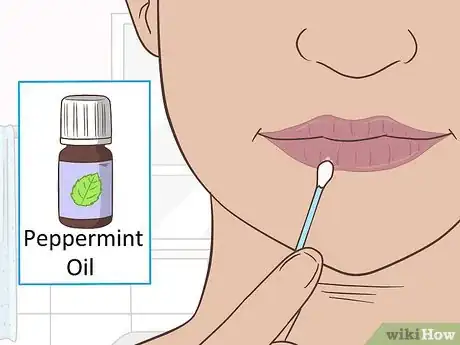
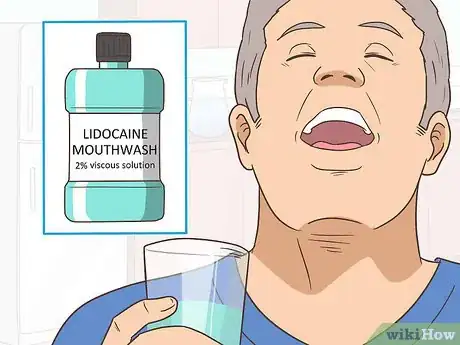
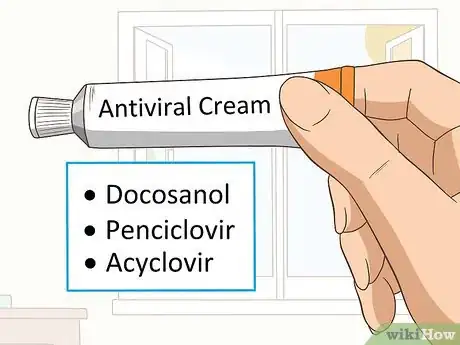
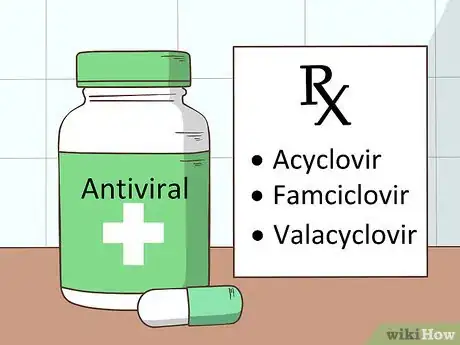
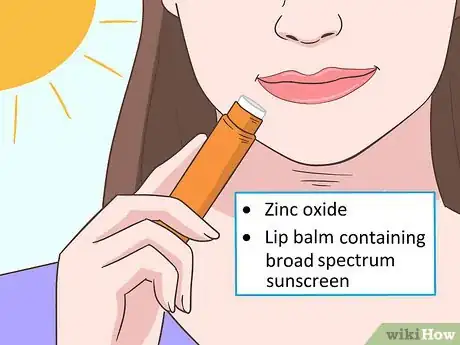
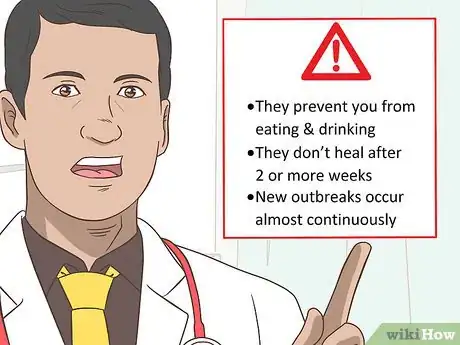
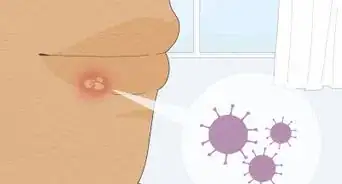







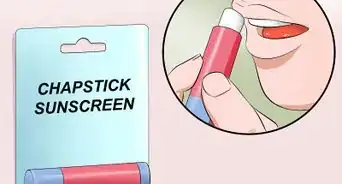

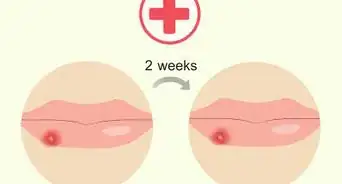











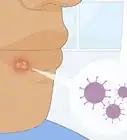
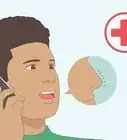





































Medical Disclaimer
The content of this article is not intended to be a substitute for professional medical advice, examination, diagnosis, or treatment. You should always contact your doctor or other qualified healthcare professional before starting, changing, or stopping any kind of health treatment.
Read More...